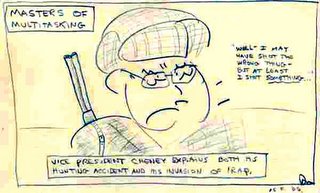NYTW
While we await more official statements, backtracking, and gossip from the fallout of NYTW's announcement to cancel a play for perceived anti-Israel views, let us also consider the following...
Whatever the provocations of the play, it relays the testimony of an American activist protesting one of the most brutal military face-offs in the Gaza conflict. Without knowing more about the script, to me it seems there should be enough room here for some criticism of the Sharon government without crossing "sensitivity" lines. But as Nicola himself puts it (highlighted by Cashmere in the "comments" below): "we were more worried that those who had never encountered her writing, never encountered the piece, would be using this as an opportunity to position their arguments." So I guess the specific content of the play is irrelevant. (And, hey, not knowing the script makes me even more qualified to comment!)
Second, keep in mind a mass rebellion of subscribers is not necessary to make a nonprofit company shiver. It takes just one big donor, one prominent board member to object. One wonders if the very idea of a woman denoucing Israeli militarism and supporting Palestinian statehood from the stage of NYTW would be enough to rub some v.i.p. the wrong way. Or, being that board is made up of nothing if not good businessmen, someone advised a little caution and "risk management."
Also, think about this...London-based conservative critic/blogger Clive Davis asserts: "My Name Is Rachel Corrie is a painfully mediocre piece of agit-prop"--presumably based on seeing the Royal Court premiere in London. Now he may have his own political biases in the matter. But this does throw into focus the question of why NYTW decided to program this piece to begin with. Either they belived wholeheartedly in its value (message included) or... At this point I have to wonder about the Alan Rickman factor. The lugubrious-voiced and wildly successful thespian isn't the first type one would imagine mentoring and co-directing this activist barebones piece. But there you are. And it is hard not to imagine NYTW being...impressed by such an association.
So as a Blog with no journalistic ethic to stop me from recklessly speculating....is it possible Mr. Nicola signed onto the piece sight unseen, dazzled by just the catchphrase "Harry Potter's Alan Rickman presents new Political Play!" (And with just one actor, it's cheap at that!)
Rickman's side of the story?
"I can only guess at the pressures of funding an independent theatre company in New York, but calling this production "postponed" does not disguise the fact that it has been cancelled," Mr Rickman said in a statement. "This is censorship born out of fear, and the New York Theatre Workshop, the Royal Court, New York audiences - all of us are the losers."See more on the Brit background and perspective here.
And finally--"Jew York City" or not, if such a play cannot happen here, where else will there be the freedom of discourse for this? And please don't say Syria.
(As a mildly self-disliking half-Jew, Playgoer reserves the right to employ any phrases and/or rhetoric that could possibly be construed as anti-semitic. So there.)












